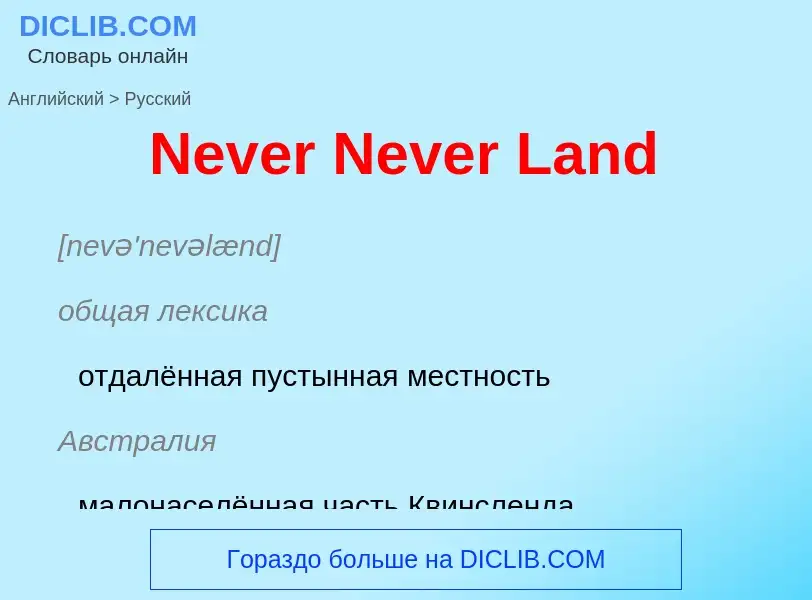Traducción y análisis de palabras por inteligencia artificial ChatGPT
En esta página puede obtener un análisis detallado de una palabra o frase, producido utilizando la mejor tecnología de inteligencia artificial hasta la fecha:
- cómo se usa la palabra
- frecuencia de uso
- se utiliza con más frecuencia en el habla oral o escrita
- opciones de traducción
- ejemplos de uso (varias frases con traducción)
- etimología
Never Never Land - traducción al ruso
[nevə'nevəlænd]
общая лексика
отдалённая пустынная местность
Австралия
малонаселённая часть Квинсленда
литература
страна
где сбываются мечты
страна вечного детства
«остров Где-то-там»
['nevəlænd]
синоним
[,nevə'nevə]
шутливое выражение
"вовек не расплатиться", покупка в рассрочку
синоним
существительное
общая лексика
утопия, несбыточная мечта
разговорное выражение
призрачное существование
витание в облаках
покупка в рассрочку
Definición
Wikipedia

Neverland is a fictional island featured in the works of J. M. Barrie and those based on them. It is an imaginary faraway place where Peter Pan, Tinker Bell, Captain Hook, the Lost Boys, and some other imaginary beings and creatures live.
Although not all people who come to Neverland cease to age, its best-known resident famously refused to grow up. Thus, the term is often used as a metaphor for eternal childhood (and childishness), as well as immortality and escapism.
The concept was first introduced as "the Never Never Land" in Barrie's theatre play Peter Pan, or The Boy Who Wouldn't Grow Up, first staged in 1904. In the earliest drafts of the play, the island was called "Peter's Never Never Never Land", a name possibly influenced by the 'Never Never', a contemporary term for outback Australia. In the 1928 published version of the play's script, the name was shortened to "the Never Land". Although the caption to one of F. D. Bedford's illustrations also calls it "The Never Never Land", Barrie's 1911 novelisation Peter and Wendy simply refers to it as "the Neverland," and its many variations "the Neverlands."
Neverland has been featured prominently in subsequent works that either adapted Barrie's works or expanded upon them. These Neverlands sometimes vary in nature from the original.



